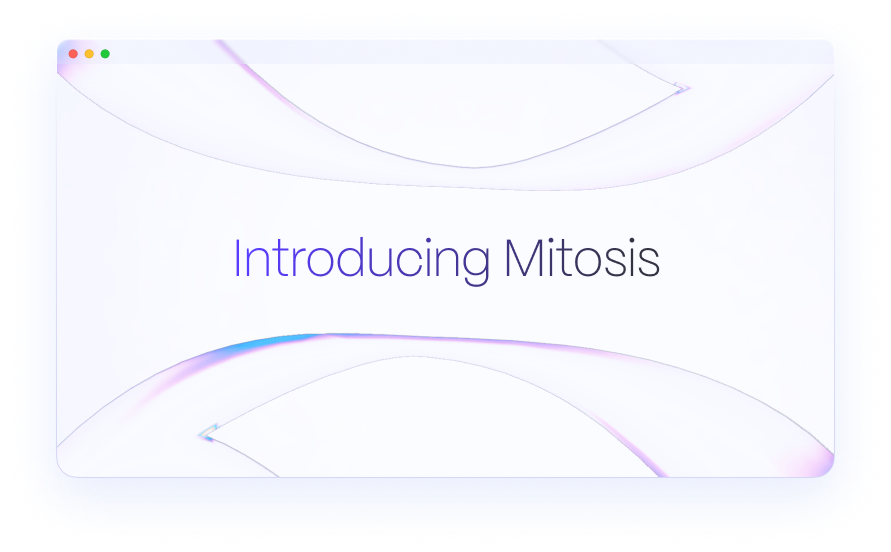Introduction
What is Mitosis?
A high-level overview of what Mitosis is.
 Mitosis introduces a protocol that transforms DeFi liquidity positions into programmable components while solving fundamental market inefficiencies. In current DeFi systems, when users provide liquidity to protocols, they encounter two significant limitations. First, their positions become static and illiquid - once assets are committed, they can’t be effectively used elsewhere. Second, the most profitable opportunities remain exclusive to large investors who can negotiate private agreements, creating an uneven playing field that mirrors traditional finance systems.
The protocol addresses these challenges through a systematic process that makes liquidity both programmable and accessible. When users deposit assets into Mitosis Vaults across different blockchain networks, they receive Hub Assets on the Mitosis Chain that represent their deposits. These Hub Assets can then be committed to yield-generating opportunities through two distinct frameworks: Ecosystem-Owned Liquidity (EOL) or Matrix. EOL enables collective management of pooled assets through democratic governance, where participants vote on allocation strategies. Matrix, on the other hand, allows direct participation in curated liquidity campaigns with predetermined terms. Both frameworks issue specialized tokens - miAssets for EOL and maAssets for Matrix - that represent users’ positions.
What makes Mitosis transformative is how these position tokens function as programmable building blocks for sophisticated financial engineering. Unlike conventional DeFi where liquidity remains locked in isolated pools, Mitosis position tokens can be traded, used as collateral, decomposed into principal and yield components, or combined to create new financial instruments. This programmability enables entirely new possibilities in how users can manage and optimize their liquidity positions. The Mitosis Chain provides purpose-built infrastructure for applications to leverage these capabilities, supporting advanced trading mechanisms and sophisticated financial strategies.
The protocol’s design addresses market inefficiencies through collective bargaining power. By aggregating individual deposits, Mitosis gives all participants access to preferential yields previously reserved for large-scale providers. The standardized frameworks and transparent price discovery mechanisms ensure everyone can accurately value their positions and understand market terms. This democratization of access is reinforced by the protocol’s governance mechanisms, particularly in EOL, where token holders have direct influence over capital allocation decisions.
Central to Mitosis is its settlement system that maintains synchronization between activities across supported networks and the Mitosis Chain. Through sophisticated yield, loss, and extra rewards settlement processes, the protocol ensures accurate tracking and distribution of returns. This infrastructure supports the development of complex financial products built on top of position tokens, enabling the creation of advanced DeFi applications that weren’t previously possible.
Through this comprehensive approach, Mitosis establishes a new paradigm for DeFi liquidity - one where positions are not just stores of value but programmable components in a sophisticated financial system. By combining democratized access to yields with advanced financial engineering capabilities, the protocol creates infrastructure for a more efficient, equitable, and innovative DeFi ecosystem.
Mitosis introduces a protocol that transforms DeFi liquidity positions into programmable components while solving fundamental market inefficiencies. In current DeFi systems, when users provide liquidity to protocols, they encounter two significant limitations. First, their positions become static and illiquid - once assets are committed, they can’t be effectively used elsewhere. Second, the most profitable opportunities remain exclusive to large investors who can negotiate private agreements, creating an uneven playing field that mirrors traditional finance systems.
The protocol addresses these challenges through a systematic process that makes liquidity both programmable and accessible. When users deposit assets into Mitosis Vaults across different blockchain networks, they receive Hub Assets on the Mitosis Chain that represent their deposits. These Hub Assets can then be committed to yield-generating opportunities through two distinct frameworks: Ecosystem-Owned Liquidity (EOL) or Matrix. EOL enables collective management of pooled assets through democratic governance, where participants vote on allocation strategies. Matrix, on the other hand, allows direct participation in curated liquidity campaigns with predetermined terms. Both frameworks issue specialized tokens - miAssets for EOL and maAssets for Matrix - that represent users’ positions.
What makes Mitosis transformative is how these position tokens function as programmable building blocks for sophisticated financial engineering. Unlike conventional DeFi where liquidity remains locked in isolated pools, Mitosis position tokens can be traded, used as collateral, decomposed into principal and yield components, or combined to create new financial instruments. This programmability enables entirely new possibilities in how users can manage and optimize their liquidity positions. The Mitosis Chain provides purpose-built infrastructure for applications to leverage these capabilities, supporting advanced trading mechanisms and sophisticated financial strategies.
The protocol’s design addresses market inefficiencies through collective bargaining power. By aggregating individual deposits, Mitosis gives all participants access to preferential yields previously reserved for large-scale providers. The standardized frameworks and transparent price discovery mechanisms ensure everyone can accurately value their positions and understand market terms. This democratization of access is reinforced by the protocol’s governance mechanisms, particularly in EOL, where token holders have direct influence over capital allocation decisions.
Central to Mitosis is its settlement system that maintains synchronization between activities across supported networks and the Mitosis Chain. Through sophisticated yield, loss, and extra rewards settlement processes, the protocol ensures accurate tracking and distribution of returns. This infrastructure supports the development of complex financial products built on top of position tokens, enabling the creation of advanced DeFi applications that weren’t previously possible.
Through this comprehensive approach, Mitosis establishes a new paradigm for DeFi liquidity - one where positions are not just stores of value but programmable components in a sophisticated financial system. By combining democratized access to yields with advanced financial engineering capabilities, the protocol creates infrastructure for a more efficient, equitable, and innovative DeFi ecosystem.
